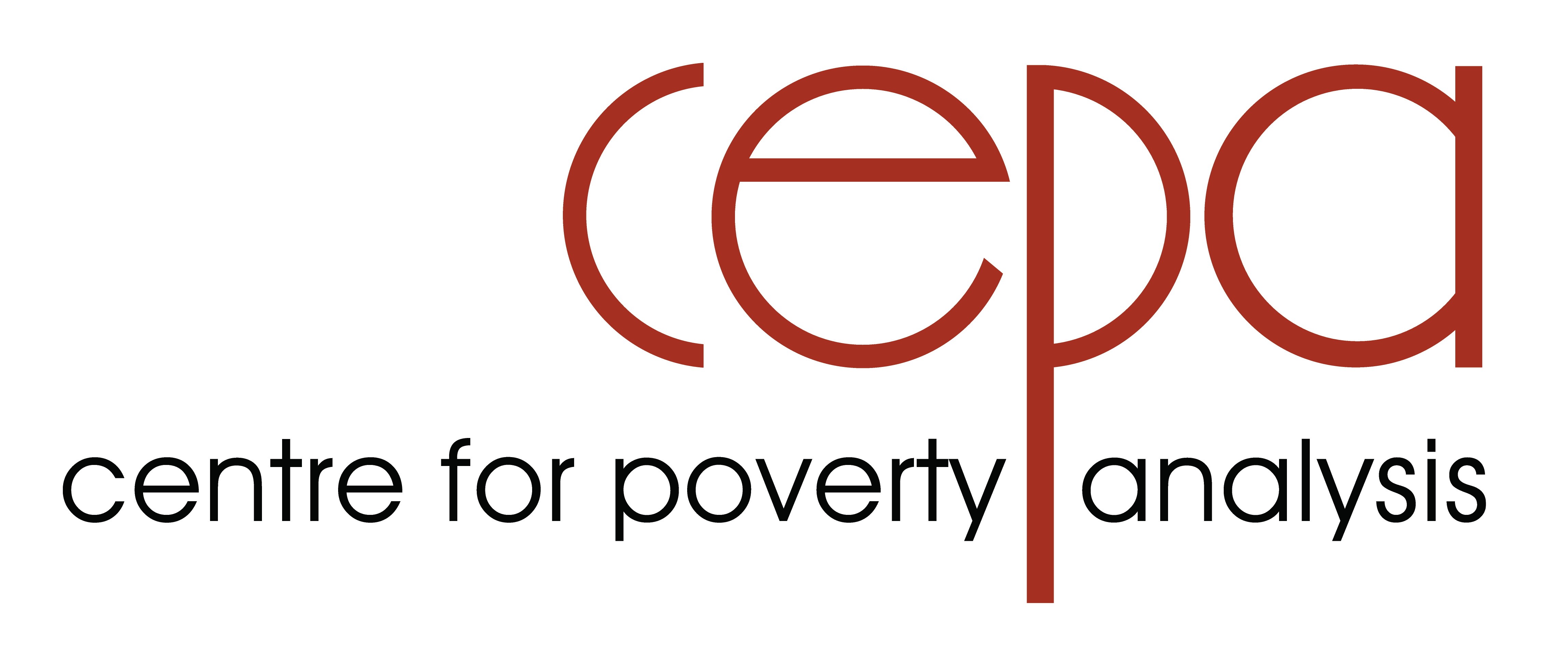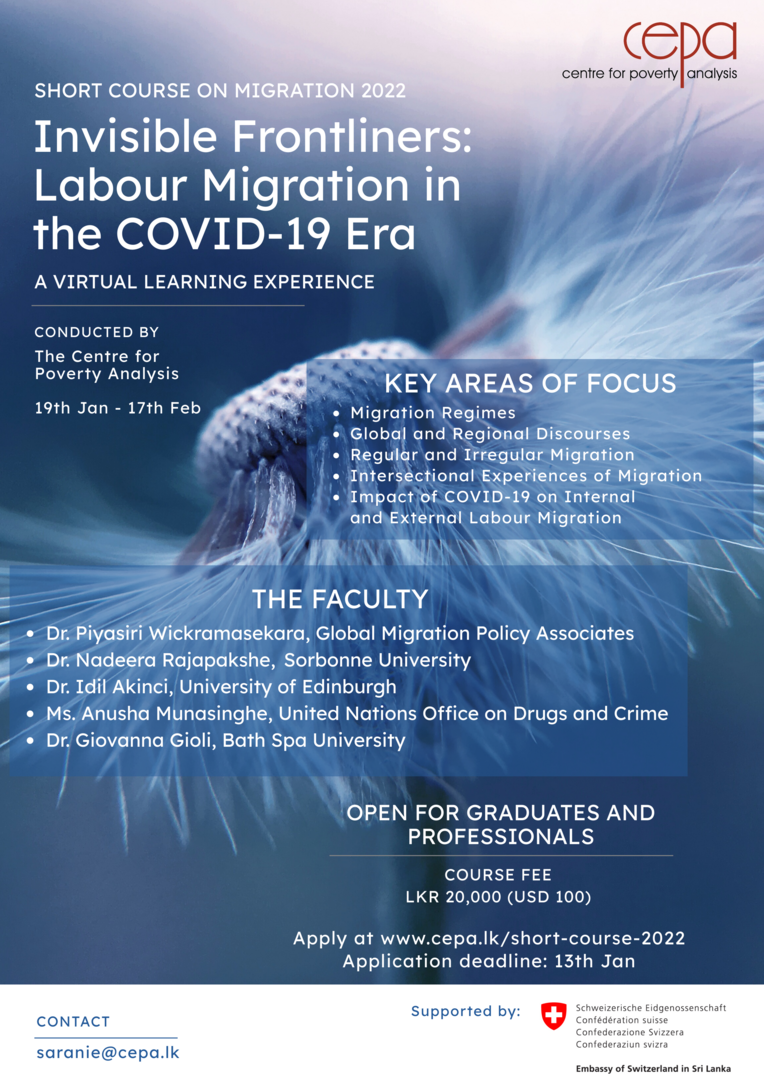CEPA In Sight – Vol.8
January 2022 | Vol. 8
The COVID-19 pandemic has brought about many changes economically and socially, that have impacted all socioeconomic groups in various ways. Highlighted below are the COVID-19 related outputs produced by CEPA over the past year, which brings to light the impact of the pandemic and the potential way forward.
CEPA in Sight
Vantage Point
A Newsletter by The Centre for Poverty Analysis

Hello! We at CEPA wish you a healthy and peaceful New Year! This volume of CEPA’s newsletter focuses on our recent work in relation to the impact of the COVID-19 pandemic. Connect with us at insight@cepa.lk with your thoughts, suggestions and ideas for collaboration.
Affordability of Food during the COVID-19 Pandemic
1
2
3
From the Frying Pan into the Fire
Coping with regional disparities in services during a pandemic
by Nadhiya Najab
The Indivisible Effect
The impact of COVID-19 on peace and poverty in Asia
by Minuri Perera
by Thilani Kaushalya and Dilshani Ranawaka
Lessons Learned
4
5
6
Digital education as experienced during COVID-19
by Karin Fernando
Staying Afloat
The impact of COVID-19 on access to credit for SMEs
by Minuri Perera
Financing and Managing through COVID Lockdowns
A closer look at the lower income tiers
by Dilshani Ranawaka
For more of our work on the impact of the pandemic visit our blog.
What are your future plans as a researcher?
Since we have been working on specific youth areas, I would like to do some research on the impact of social media and its trends to understand the way in which people engage in political discussions in the virtual world. I would also like to continue my post-graduate studies and write on youth, media, and other issues that I am passionate about.
Past
Events
October - December 2021
31
What are your main areas of interests?
My main area of interest is anthropogenic climate change and how it affects people, particularly those who are already vulnerable to its effects. In addition, I am also interested in Small and Medium Scale Enterprise (SME) development, with a focus on women and youth entrepreneurs.
I am a Junior Research Professional working under the Sustainable Development thematic. I hold a BA in Economics from the University of Colombo. In addition, I also hold a BSc in International Development from the University of London where my interest in climate change grew when I pursued Global Environmental Problems and Politics as a subject. I began working at CEPA as a research intern. Throughout my short yet eventful journey at CEPA, I have worked on several projects concerning marginalised communities and people in poverty. This journey has shown me various new avenues to pursue as a researcher and has humbled me and helped me grow as a human being.
MEET A
CEPA
RESEARCHER
Who is Minuri?
What goals do you hope to achieve at CEPA?
What is one of the most memorable research project you worked on last year?
What I hope to achieve at CEPA – which has been provided for to a large extent – is a platform. A platform to voice my opinions, pursue my research interests and also to learn and grow as a researcher as well as a human being.
What are your future plans as a researcher?
My future plans include further education in climate change adaptation and disaster risk management. I hope my academic background and everything I have learned and will continue to learn at CEPA, will help me effect change one day.
10th November
20th November
Thamindri Aluvihare presented at the conference ‘In the Shadow of International Relations’ organised by the Department of International Relation, Faculty of Arts of the University of Colombo on ‘The Evolving Role of Media Diplomacy in the Digital Age; PRC Media Diplomacy in the Context of Sri Lanka.
24th November
Karin Fernando was a speaker at the Virtual Research Launch titled ‘Digital Sri Lanka During COVID-19 Lockdowns’ organised by LIRNEasia. The online event was organised to present the findings of a nationally representative survey with a 2500 sample across Sri Lanka.
Chandima Arambepola was a panellist for the above session, where insights on COVID-19 and the resultant inequalities from across the southern hemisphere were shared. The panel was part of the Southern Voice's 3rd Research Conference ‘Shaping an Equitable Post-COVID World: The Role of Global South Think Tanks’.
Intergenerational Dialogue Series IV
Youth and Identity Discourses
in Post-war Sri Lanka
The fourth Intergenerational Dialogue Series was held on the 2nd of December 2021. The session was hosted virtually and members of the Social Cohesion and Reconciliation thematic presented the research findings from the study ‘Youth and Identity Discourses in Post War Sri Lanka’.
The presentation was followed by a panel discussion featuring Prof. Chandraguptha Thenuwara (University of the Visual and Performing Arts), Ms. Swasthika Arulingam (Attorney at Law), Mr. Prihesh Ratnayake and Mr. Joy Jegarthan (Hashtag Generation).
The study was supported by the Strengthening Reconciliation Processes in Sri Lanka (SRP) Programme jointly funded by the European Union, GIZ and the British Council. The paper will be published soon.
Open Forum: Improving Access to Support Services for Victims of Human Trafficking
The 65th Open Forum on "Improving Access to Support Services for Victims of Human Trafficking’ was held on 30th of November 2021. Ms. Chandima Arambepola (CEPA), Dr. Ramani Jayasundere (The Asia Foundation, Sri Lanka) and Prof. Camena Gunaratne (Open University of Sri Lanka and Chairperson, CEPA) discussed key issues related to human trafficking and access to services in Sri Lanka. The session was moderated by Dr. Gayathri Lokuge (CEPA). The discussion centred around a study conducted by CEPA in collaboration with the Asia Foundation (TAF), entitled ‘Optimising and Screening Support Services for Victims of Gender Based Violence and Trafficking in Persons’. The study was funded by the Office to Monitor and Combat Trafficking in Persons by USDOS as a multi-country study covering Nepal, India and Sri Lanka.
Minuri Perera, Dilshani Ranawaka and Gayathri Lokuge each presented a paper at the above conference hosted by The Centre for Women's Research (CENWOR). Karin Fernando moderated a session at the conference.
8th December
My favourite research project from last year was the scoping assessment we did for the Blue Nations Alliance regarding co-management structures in Marine Protected Areas (MPAs). It was my first project that had a focus on the fisheries sub-sector. Even though, the first few deadlines of the study were really tight which made us work insane hours, I learned so much from that study. The most interesting fact that I learned is that only less than 1% of Sri Lanka’s coastal belt is declared protected and we have such a long way to go and make a concerted effort to achieve the Sustainable Development Goal (SDG) 14.5 which aims to conserve at least 10% of coastal and marine areas by 2030

Migration as a ‘Win-Win-Win' for the Countries of Origin, Destination and the Individual
In the Shadow of International Relations
CENWOR 16th National Convention on Women’s Studies
Digital Sri Lanka During COVID-19 Lockdowns